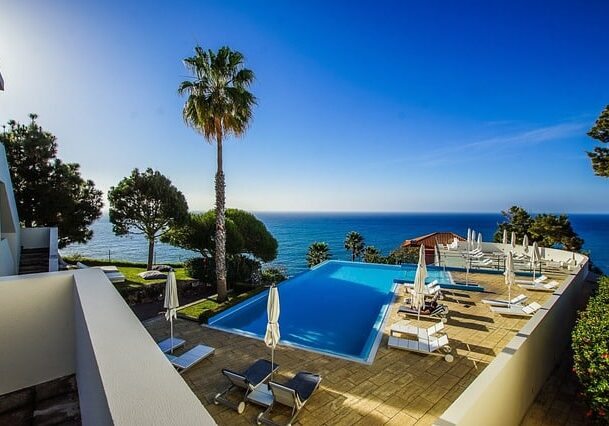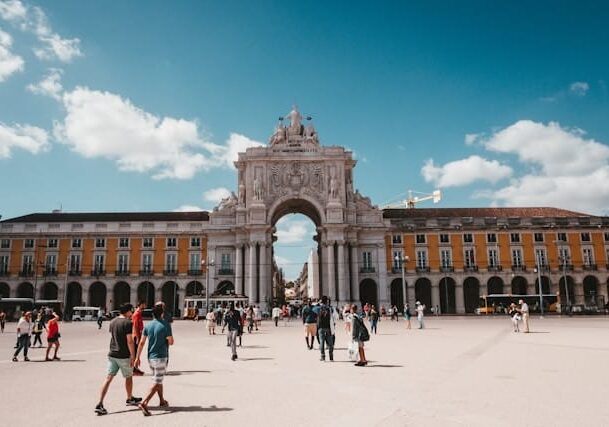Updated: December 23, 2025
Interested in moving to Portugal from the UK? Many UK nationals, especially digital nomads, retirees, and business experts want to settle in Portugal due to its affordable living costs, quality healthcare, and plenty of options for a residency visa.
In fact, Brits are among the top three nationalities to receive a Portugal Golden Visa for residency in the country, according to the latest Portuguese Migration and Asylum Report. The Portuguese government created favorable immigration policies for foreign residents with a minimum monthly income to support themselves and eligible family members.
So, how easy is it to move from the UK to Portugal? In this guide, you can learn everything you need to know about the different Portuguese visas for UK residents and average monthly expenses.
Stick around to read about:
Quick Summary
- As a British citizen moving to Portugal, you can expect to spend less on housing, rent, and overall monthly expenses.
- Since Brexit, you will need a residency visa, passport, and Portuguese fiscal number (NIF) to settle in Portugal for the long haul.
- Like many countries, Portugal has its share of bureaucratic processes, and things can sometimes move slowly.
Why move to Portugal from the UK?
 What makes Portugal so appealing to UK citizens? Well, there are plenty of reasons that have made British expats Portugal-bound over the years, each contributing to an overall upgrade in their quality of life. The top reasons to move to Portugal from UK cities include:
What makes Portugal so appealing to UK citizens? Well, there are plenty of reasons that have made British expats Portugal-bound over the years, each contributing to an overall upgrade in their quality of life. The top reasons to move to Portugal from UK cities include:
- The warm climate: With over 300 days of sunshine a year, especially in the south, Portugal offers a warm, outdoor-friendly lifestyle (quite a contrast to the UK’s colder weather).
- Safety: Consistently ranked as one of the safest countries in Europe (ranked seventh on the 2025 Global Peace Index)
- Welcoming locals: The Portuguese are known for their friendliness, making it easier for newcomers to feel at home.
- Quality healthcare: Portugal ranked 23rd globally in the 2025 Numbeo Health Care Index. Its healthcare system outperformed Germany, which ranked 25th. Portugal’s healthcare is both high-quality and affordable.
- Education: Portugal offers solid public education and 51 high-quality international schools featuring a range of curricula (including the British IGCSE curriculum). Some of the best international schools in Portugal catering specifically to British learners are: The British School of Lisbon, IPS Cascais, Nobel International School Algarve, Oporto British School in Porto, and St. Julian’s School in Carcavelos (just outside of Lisbon).
- Retirement-friendly: Portugal is a firm favorite with retirees. It offers a warm climate with an affordable yet high-quality of life. The excellent healthcare, abundance of top golf courses, and relaxed pace of life add to its appeal. You will also find world-class retirement homes in Lisbon, Portugal.
- Tax incentives: The Tax Incentive for Scientific Research and Innovation (IFICI) offers reduced tax rates for eligible professionals, including those in tech or science fields. Also, the UK-Portugal Double Taxation agreement ensures that British citizens will not pay tax twice on the same income.
- Lower cost of living: Everyday expenses, from housing to healthcare, are significantly more affordable than in the UK.
Cost of Moving & Settling in Portugal
 To move to Portugal from the United Kingdom, you will need enough money to cover the initial costs like visas, housing deposits, travel, and ongoing monthly expenses. It is difficult to say exactly how much money you will need, but a good starting point for a single person is €870 on a D7 Visa or at least €2,000 a month if you plan on settling in Portugal’s major cities.
To move to Portugal from the United Kingdom, you will need enough money to cover the initial costs like visas, housing deposits, travel, and ongoing monthly expenses. It is difficult to say exactly how much money you will need, but a good starting point for a single person is €870 on a D7 Visa or at least €2,000 a month if you plan on settling in Portugal’s major cities.
When renting, expect to pay a deposit for one to three months in advance. For example, to rent a one-bedroom apartment in the Lisbon city center, you can expect to pay €1,404 per month or €1,055 outside the city center. Those who live alone usually spend about €731 on monthly expenses and €2,644 for a family of four, without rent.
If you plan on shipping a whole household from the UK to Portugal, you will need around €1,700 to €4,600, based on the size of your property and the amount of furniture. If you have more belongings, a family, and choose to live in a more expensive area, like Lisbon, Porto, or the Algarve, you can spend well over €11,000.
Cost of living in UK vs Portugal
For Brits, moving to Portugal often gives them a double advantage: a better quality of life and spending less money. Overall, the cost of living in the United Kingdom is 37.4 percent higher than in Portugal. Compared to the UK, Portugal offers a more affordable cost of living in almost every category, from housing to groceries.
Here’s how they stack up, based on Numbeo:
- Housing: Renting or buying is significantly cheaper in Portugal. Renting in Portugal can decrease your housing costs by up to 28.5 percent, and if you’re buying, you could pay up to 60 percent less per square meter compared to the UK.
- Utilities: Electricity, water, and gas can be 50-100 percent cheaper in Portugal, depending on where you choose to stay.
- Groceries: In the UK, grocery prices at local markets are 30.6 percent more expensive compared to Portugal, especially for fresh produce.
- Dining out: Prices in restaurants in the UK are 60.1 percent more expensive than in Portugal.
- Transport: Public transport in Portugal is affordable, with monthly passes costing around €40, compared to €82.93 in the UK.
- Healthcare: Public healthcare is low-cost in Portugal, and private insurance is more affordable than in the UK.
Can you move to Portugal from UK after Brexit?
Moving to Portugal from UK after Brexit looks a little different to what it was before. Prior to 2021, UK nationals could relocate without visas due to EU membership.
However, to move to Portugal from the UK after Brexit, UK citizens now require visas and permits for long-term stays (longer than 90 days) as freedom of movement is no longer automatic. You also don’t get rights by default for work, healthcare, or residency.
Visa & Residency Options for UK Citizens
As a UK citizen, you are now a non-EU national, which means you will need a long-stay visa to settle in Portugal. Many options are available, but the most popular are the D7 Visa, D8 Visa, Golden Visa, and the D1 or D2 Visas.
How to get a Portugal residency permit for UK citizens: types of visas
To get a residency permit, British citizens must first apply for a specific long-stay national visa from the United Kingdom at a Portuguese Consulate or a VFS Global. After the visa is approved, you attend an appointment with the AIMA (Agency for Integration, Migrations and Asylum) where you provide biometrics and finalize your two-year residence card.
Here are the most common types of visas British nationals can apply for.
 Portugal Golden Visa program requirements
Portugal Golden Visa program requirements
The Portugal Golden Visa program is an ideal pathway to residency in Portugal for UK citizens who prefer a residency-by-investment approach. It requires a financial investment from Golden Visa applicants via one of the following routes:
- €500,000 investment in non-real estate Portuguese investment funds or private equity funds
- €500,000 donation towards scientific research
- €250,000 donation to the development of Portuguese arts and culture, or the recovery or maintenance of national cultural heritage
- Creation and maintenance of ten jobs in Portugal during the required period
- €500,000 share capital investment plus the creation of five jobs or the maintenance of ten jobs
One of the biggest perks for Golden Visa holders when moving to Portugal from the UK is that you only need to spend an average of seven days per year in Portugal to maintain your residency. This makes it ideal for jetsetters or those with international commitments.
While there is no option to get Portuguese citizenship by investment, the Golden Visa offers an indirect route to citizenship. After five years of residency, you can apply for Portuguese citizenship.
 D7 Visa Requirements
D7 Visa Requirements
If you’re planning a quieter life supported by passive income, the D7 Visa – also known as the Portugal retirement visa or passive income visa – might be your match. This option caters to UK retirees or anyone with a steady passive income stream from pensions, rentals, or investments.
To qualify, you must demonstrate sufficient income to support yourself (and your family, if applicable) while living in Portugal. This means demonstrating a passive income at least equivalent to the Portuguese minimum wage, which is €870 in 2025.
Unlike the Golden Visa, the passive income visa requires you to spend the majority of your time in Portugal, making it perfect for those ready to embrace a new lifestyle full-time. Whether you are looking to relocate to a luxury care home in Portugal or enjoy the charming city of Porto, the D7 Visa is a top choice for a smooth move to the country.
The D7 Visa and Golden Visa both allow for full residency, access to healthcare, and eventually a permanent residence permit or the opportunity to apply to become a Portuguese citizen after five years.
 Other visa types for UK citizens
Other visa types for UK citizens
Beyond the Golden Visa and D7 Visa, Portugal offers several other visas tailored to specific needs. Here are a few of the other popular choices:
- D1 Visa (Employment Contract): This visa is ideal for Brits who already have a valid job offer from a Portuguese company. It provides two entries to Portugal for the visa holder and is valid for four months.
- D2 Visa (Entrepreneur Visa): For entrepreneurs and business owners, the D2 Visa provides an opportunity to launch or relocate your business to Portugal.
- D6 Visa (Family Reunification Visa): If you have family members already residing in Portugal, the D6 Visa allows you to join them.
- D8 Visa (Digital Nomad Visa): Perfect for remote workers and freelancers, this visa allows you to live in Portugal while working for clients or companies based outside the country. You’ll need to earn a monthly income of at least €3,480 (four times the minimum wage) to qualify for this option.
- A Temporary Stay Visa is also a good option for those who plan to stay in Portugal for more than 90 days but less than one year.
If you’re moving to Portugal from the USA or any other country outside the EU, these visa options are available, too.
We recommend getting in touch with the migration experts at Global Citizen Solutions to do a thorough analysis of your goals, assist with your application to the Portuguese Consulate, and find out which may be the best pathway for you.
Comparing types of visas in Portugal
Visa Type | Who It’s For | Why It’s Great | What to Watch Out For |
D7 Visa | Passive income from sources outside Portugal of at least the minimum wage in Portugal (€870 per month) | Low minimum income requirement | Income must come from passive sources, like investments or pensions |
Golden Visa | Investment of at least €250,000 in qualifying investments | Minimal time in Portugal required—perfect if you’re a frequent traveler | High upfront investment compared to other option |
D8 Visa | Self-employed individuals or remote workers earning at least four times the minimum wage (about €3,480) | Opportunity to live and work in Portugal | Requires detailed documentation, including proof of income, letter of employment, application form, and cover letter, among others |
D1 Visa | Non-EU workers with a job offer | Chance to work and live in Portugal | Processing can be very slow |
D2 Visa | Innovative start-up business idea with a detailed business plan | Support the Portuguese economy while growing your business in Portugal | Competition is tough, and not all start-ups succeed |
D6 Visa | Close family members of Portuguese citizens or residents | Allows family members to live in Portugal with their loved ones | Your application depends on your family member’s status in Portugal |
Healthcare for UK Citizens in Portugal
Portugal offers excellent healthcare through the Portuguese National Health Service, the Serviço Nacional de Saúde (SNS), and a robust private health insurance sector.
Once you’ve received residency in Portugal, you can access the public system by registering at your local health center with your Portuguese residence permit, NIF (Portuguese tax identification number), and proof of address.
Public healthcare comes at a very low cost and is free for those under 18 or over 65 years old. The public system provides comprehensive services, though waiting times for non-urgent care can be long.
UK citizens moving to Portugal can also use the Global Health Insurance Card (GHIC), which replaced the European Health Insurance Card after Brexit. For retirees receiving a UK state pension, the S1 form allows you to transfer healthcare entitlements to Portugal, granting access to the SNS at reduced or no cost.
Many expats from European countries also choose private insurance for quicker access to specialists and treatments, with policies starting at around €50 per month, depending on the level of coverage. For retirees moving to Portugal who require additional care, you will also find retirement homes for assisted living in Portugal.
Moving to Portugal from UK: Opening a Portuguese Bank Account
Opening a bank account in Portugal is a crucial step for expats. A local bank account is a practical option for managing your finances, paying rent, collecting rental income, or using any other services without paying hefty transaction fees. It can be very useful for those with a foreign pension income or a stable passive income.
Most banks require the following documentation:
- A valid passport or photo ID
- Proof of address
- Portuguese tax number (NIF or Número de Identificação Fiscal)
- Proof of income
- A minimum deposit to get your account started
Renting or Buying Property in Portugal
Buying property in Portugal after Brexit has changed for UK nationals. Although the process remains the same, they often have higher down payments since they are no longer members of the EU.
Portugal is increasingly on the radar of UK and Irish property buyers. With rental prices rising, owning a home can protect you from escalating costs, providing stability and predictability. Additionally, Portugal’s property market has seen consistent growth, with rising demand from international buyers making real estate a solid investment.
That said, renting is a practical choice for those who want to test the waters before committing to a specific area. It also allows for flexibility if you’re unsure about your long-term plans. However, with rents climbing in popular cities and tourist hotspots, monthly costs can quickly add up. For example, renting a one-bedroom apartment in Lisbon city center can cost €1,404 per month or more without the long-term benefit of owning the home.
Tax Implications for Moving From UK to Portugal
When you move to Portugal and become a tax resident, you start paying taxes on your worldwide income in Portugal. Since the UK and Portugal have a tax treaty or Double Taxation Agreement (DTA), you don’t get taxed on the same income twice.
 How to become Portuguese tax residents?
How to become Portuguese tax residents?
The Portuguese authorities consider you a tax resident after you spend more than 183 days in Portugal, or you have a permanent residence there. If you are liable to pay tax, you must also apply for a tax number (or NIF). To get a NIF, you can visit a local tax office in Portugal with a passport and proof of address. You can also have a legal representative apply remotely on your behalf.
It is mandatory for non-residents to have a tax representative. To find out more, check out our ultimate guide to taxes in Portugal.
Top Places for UK Expats to Live in Portugal
Curious about where to live when moving to Portugal from the UK? Here are some of the most popular locations among expats:
- Lisbon: Moving to Lisbon from the UK is perfect for professionals, families, and anyone who loves a rich cultural scene. Think cobblestone streets, a thriving food scene, and endless cultural events—all with international schools and global connections right on your doorstep. The average property price in the Lisbon Metropolitan Area in 2024 was €4,935 per square meter. Check out our article on Lisbon real estate for more information.
- The Algarve: Picture golden beaches like Marinha Beach, world-class golf courses like Quinta do Lago, and expat-friendly communities. It’s a dream for retirees or anyone chasing year-round sunshine and a laid-back lifestyle. The average property price in the Algarve region in 2024 was €4,385 per square meter, but prices will vary per neighborhood and city. Read our Algarve, Portugal, real estate guide for the latest insight.
- Porto: A picturesque city with a thriving wine industry and a lower cost of living than Lisbon, Porto appeals to families, entrepreneurs, and creatives. The average property price in the Porto Metropolitan Area in 2024 was €3,937 per square meter. You can read more about Porto, Portugal, real estate in our guide.
- Cascais: A luxurious seaside town near Lisbon, bringing you the ultimate mix of seaside luxury and city convenience. You’ve got beaches, stunning homes, top-notch schools, and you’re just a quick train ride from Lisbon. The average property price in Cascais in 2024 was €7,260 per square meter. Our Cascais, Portugal, real estate article provides all the details.
Finding a Job for UK Citizens in Portugal
 Portugal’s job market is steadily growing, with opportunities in tourism and hospitality, tech and IT, healthcare, and education. English-speaking roles are available, but learning Portuguese can put you ahead of the competition.
Portugal’s job market is steadily growing, with opportunities in tourism and hospitality, tech and IT, healthcare, and education. English-speaking roles are available, but learning Portuguese can put you ahead of the competition.
UK qualifications are generally well-recognized, but competition may still be tough in some sectors.
For insider advice on finding a job in Portugal, our guide on working in Portugal has all you need to know.
Adapting to Life in Portugal: Language, Culture, and Lifestyle
Once you’ve made your journey from the UK and started to settle in, one of the best ways to start adapting and integrating into the Portuguese culture is to learn the language.
Learning Portuguese is invaluable for integrating into local communities and can help you find a job. You may want to learn Portuguese via free or low-cost language courses, which are also widely available to help you along the way.
Embrace Portugal’s relaxed lifestyle, vibrant festivals, and delicious cuisine, and you’ll feel like a local in no time. Many expat social events and communities can help ease the transition. You can also consult the Portuguese tax authorities if you have problems paying taxes.
Driving in Portugal: Converting Your UK Driving License
The driving process for UK residents in Portugal is straigthforward because of a mutual recognition and exchange agreement signed between the two countries.
If you are a resident in Portugal, you can keep driving with your valid UK licence until it expires. But first, you must register the UK license with Instituto da Mobilidade e dos Transportes (IMT) in the first 60 days of obtaining residency.
When your UK licence is about to expire, you must apply to exchange it for a Portuguese one. Although you have up to two years from gaining residency to complete the exchange, it is best to start the application within 90 days of establishing residency.
You begin by completing an onling application form via the IMT portal. After the application is approved, you will be asked to come for an in-person appointment and provide your original documents, biometrics, and pay a fee of around €30.
These documents often include:
- Your valid UK license
- Proof of identity
- A medical certificate
- Proof of your Portuguese residency
The best part? You don’t need to take a driving test to convert your license.
Final Thoughts: How to Move to Portugal from UK
Moving to Portugal from the UK requires careful planning, and you’ll need to follow several steps to get set up, such as securing residency. When preparing for the move, make a list of things you will need to consider – money, accommodation, exchanging your UK driving license, and so on. When you are in Portugal, you will need to register with the public health system and set up a bank account, but with expert assistance, you’ll find the process to be quite straightforward.
Moving to Portugal from the UK involves securing a visa, finding your ideal place to live, and adapting to a different culture, but the reward for your efforts is well worth it. UK citizens can enjoy Portugal’s high-quality yet relaxed way of life, affordable cost of living, and welcoming environment. So, what’s stopping you?
Goldcrest: How We Can Help You
Goldcrest is a buyer’s agent that is based in Lisbon. We provide expert, impartial advice on real estate investments and how to buy property in Portugal. From scouting out the perfect property through to property acquisition, we have you covered throughout the process.
If you are looking to purchase property in Portugal, don’t hesitate to get in touch. Our team of skilled experts is available to solve all your real estate doubts, helping you with the property search and offering insightful expertise and strategic advice.
Why choose Goldcrest?
- Local knowledge: With offices located across Portugal, our presence nationwide allows us to assist you personally across the country.
- Independent service: As an independent buying agent, we do not represent any development or project. Our service is entirely tailored toward each individual client, providing you with everything you need to secure the perfect property at the best possible price. As an impartial advisor on the market, we work solely on behalf of our client and provide a service tailored to your needs and requirements.
- Streamlined process: Our real estate agents speak English and Portuguese, and our service is completely focused on providing you with a hassle-free buying experience, saving you time.
- Experienced team: Our expert real estate team has a vast local knowledge of the Portuguese property market. We have cutting-edge technology and metasearch tools at your disposal to provide full market coverage, ensuring the best investment choices and negotiated prices.
- Network of partners: We have a close network of partners, including lawyers, property management services, builders, architects, designers, and landscape gardeners, again saving you time and hassle by providing you with trusted experts in their field of work.
Frequently Asked Questions about Moving to Portugal From the UK
Is it hard to move from the UK to Portugal?
Moving to Portugal can take time, as it would in any other country. It is achievable, but requires more paperwork. Although you will be treated as a third-country national after Brexit, you have the same rights as every foreigner to move and settle there.
How much money do I need to move to Portugal from the UK?
You would need a budget of around €2,500 to €3,000 per month to cover living expenses for a couple moving to Portugal, with a higher cost of living in the city center. This could also be higher or lower depending on the accommodation type, your lifestyle, and which location in Portugal you choose to live in.
Is it cheaper to live in Portugal than the UK?
Portugal is a lot cheaper. For overall living costs, you would spend 37.4 percent more in the United Kingdom, without including rent. Rent prices are also 34.8 percent higher in the UK.
Can I claim UK benefits if I move to Portugal?
Yes, some UK benefits are claimable in Portugal. You keep your State Pension, and it still gets its annual increase. You can also export contributory payments, like certain sickness or disability benefits. But you usually cannot claim means-tested benefits. Pensioners access UK-funded healthcare with the S1 form.
How can a UK citizen get residency in Portugal to move there?
The easiest way to immigrate to Portugal as a UK citizen and get residency is via the visa option that best suits your lifestyle. The most common options are the D7 Visa (ideal for retirees or passive income earners), the D8 Digital Nomad Visa, and the Portugal Golden Visa. Once approved, you’ll receive a residence permit to live, work, and travel freely in Portugal.
What do I need to travel to Portugal from the UK?
For short visits up to 90 days in a 180-day period, UK citizens don’t need a visa, just a valid passport. For longer stays, you’ll need to apply for the appropriate visa or residency permit.
Is it better to live in the UK or Portugal?
That depends on your lifestyle. Portugal offers more sunshine, a slower pace of life, and generally lower living costs. For example, the cost of living in London is 60.9 percent higher than in Lisbon. The country is a favorite among retirees, remote workers, and young families. If you want to compare the Porto vs Lisbon property markets, check our guide.
